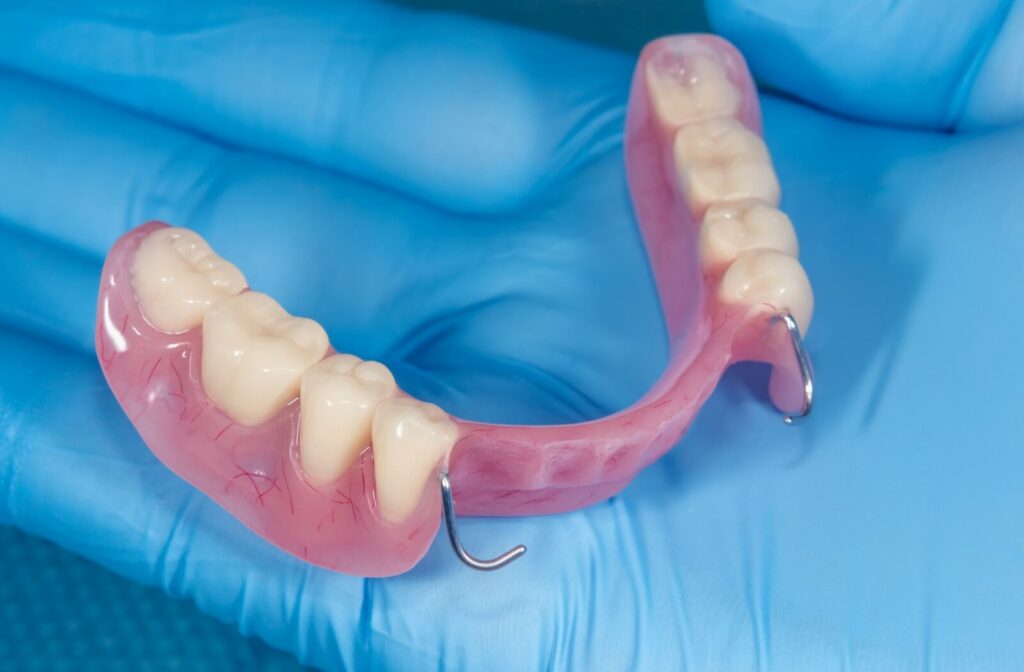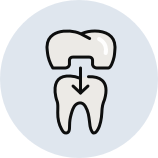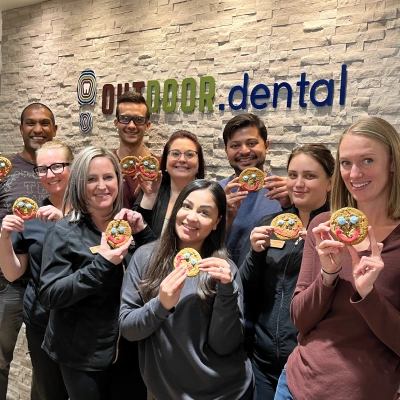Taking care of your oral health is crucial, but sometimes, things can be out of our control. Dental problems are a common concern, and they can occur simultaneously—like losing teeth and receding gums. While dentures can help solve some of these concerns, it’s natural to wonder if they can be fitted to receding gums.
You can fit dentures onto receding gums, but you need an experienced dentist to help. They may need to make additional adjustments to make sure they’re not causing further problems.
What Causes Receding Gums?
Receding gums are a common sign of gum disease. This symptom occurs when the tissue surrounding the teeth wears away, exposing more of the tooth or the tooth’s root. This can be visibly distressing and often leads to sensitivity and discomfort.
Receding gums is often due to the following:
- Gum disease (gingivitis or periodontitis)
- Aggressive brushing
- Poor oral hygiene
- Smoking or tobacco use
However, receding gums aren’t just about aesthetics. When your gums recede, tiny gaps and cracks in your teeth open up for bacteria to take hold. This can quickly lead to a higher risk of tooth decay, damage, and even bone loss.
Signs of Receding Gums
One of the first signs that you’re starting to experience receding gums is tooth sensitivity. Your teeth may feel more sensitive to hot or cold food and drinks. You may also notice that your gums look different—more of your teeth may be exposed or appear longer.
Other signs include:
- Noticeable gaps between the teeth
- Changes in the appearance of gum tissue (thinner, red, swollen)
- Loose or shifting teeth
If you notice any of these, visit your dentist as soon as possible. Receding gums can quickly lead to worse problems if you don’t address the issue, so don’t put your teeth at risk.
Tips for Preventing Gum Disease
Fortunately, gum disease is preventable to a certain extent. One of the most effective ways is to practice proper oral hygiene. Make sure that you:
- Brush your teeth 2 times a day with a soft-bristled toothbrush. Use fluoride toothpaste and make sure it reaches every tooth.
- Floss at least once a day. Make sure to reach between every tooth and along your gum line.
- Use antibacterial mouthwash regularly to remove any residual bacteria.
These steps, though simple, can dislodge any stuck particles in your mouth, remove bacteria, and strengthen your teeth and gums to prevent further problems. Regular dental checkups are also crucial—your dentist can regularly inspect your mouth to determine your risk of gum disease.
However, what if you’re not just worried about gum disease? What if you’re also dealing with missing or damaged teeth? This is when it’s time to consider restorative dentistry, like dentures.
How Dentures Work
Dentures are designed to be a convenient removable solution to missing teeth and the surrounding tissue. They come in 2 main types:
- Complete, or full, dentures which are an entire arch of teeth.
- Partial dentures are customized to fill in missing teeth while leaving space for your remaining teeth.
Both types of dentures are custom-made to fit comfortably in your mouth and resemble your natural teeth. Either option is designed to restore your teeth—both aesthetically and functionally—and your ability to eat, chew, and speak comfortably.
The process becomes a little more complicated when dealing with gum recession, though it’s still possible.
Dentures & Gum Recession
To fit dentures to receding gums, your dentist will carefully conduct a thorough examination of your mouth. They’ll examine your gums, the degree of recession, and the condition of any remaining teeth. This helps them create a customized treatment plan for your unique situation.
Next, impressions of your gums and any remaining teeth are taken to create a precise mould. This mould is used to fabricate your custom dentures to make sure they fit properly. A flexible or lined material is usually used for receding gums, as this is more comfortable and less likely to irritate your gums.
Finally, you’ll be fit for the dentures. Your denturist will take the time to make sure they’re comfortable and aren’t causing you any discomfort. Our denturist specializes in making sure you are happy and healthy.

Tips for Taking Care of Your Dentures
Once you have your new dentures, you’ll need to plan your care routine. You need to properly maintain and care for your dentures to prevent further problems. If you don’t clean them regularly, they can easily bring bacteria into your mouth and worsen issues like receding gums.
To care for your dentures, make sure that you:
- Rinse them with water after eating to remove any food particles.
- Brush them daily with a soft-bristle toothbrush and non-abrasive denture cleanser.
- Soak them overnight in a denture-cleaning solution to keep them moist and retain their shape.
- Handle them carefully to avoid dropping and damaging them.
- Inspect them for damage or wear and tear.
- Schedule regular dental check-ups for professional cleaning and to check the fit.
These simple steps can prevent bacterial transmission and help your dentures survive longer. If you ever notice any problems, visit your dentist to discuss repairs or replacements.
Choosing the Right Dentist
Receding gums can be a problem, but they don’t have to restrict you from proper dental care. If you’re dealing with any dental problems, come see our team at Outdoor Dental and let us help. We pride ourselves on delivering high-quality care and are dedicated to helping you achieve a healthy and beautiful smile. Contact us today to book your appointment!























